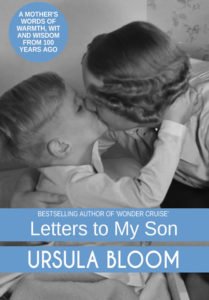 A letter taken from Ursula’s Letters to My Son, written to her son Pip when he was a baby.
A letter taken from Ursula’s Letters to My Son, written to her son Pip when he was a baby.
Frinton-on-Sea.
February 1920.
MY DEAR SON,
This is really a very difficult letter to write, because as I begin it, I realize only too well that I am not sure that I know my own mind about it.
Should one spend or save?
Should one expend happiness in youth for the sake of security in age, or should one let the future lie in the lap of the gods, and have one’s fun while one is still young and gay enough to enjoy it?
Most of us are afraid of the future. It is a grey bogey who peers out with cavernous eyes at you. It is a wolf on the threshold of to-morrow. Anything may happen. Poverty is something which is more unpleasant, and more humiliating, than most of the bogeys which life can offer you. Though poverty does not always undermine happiness. I can say with all sincerity that the happiest years of my life were the ones when I was often extremely hungry.
But the idea of poverty in your old age is something horrible. And all of us believe that we are going to live to a ripe old age, whether we are or whether we are not.
It is a reasonable conclusion to draw that we shall see seventy summers, and that the last five of those summers may be considerably handicapped with physical disabilities. We don’t all wear well. For that reason, I think it is a wise precaution to make it a rule to save a little every year towards the time when you may need to spend it in Thermogene for your rheumatics, and walking-sticks to support your doddering feet.
A great many people carry this sort of thing to excess. Saving is a fetish. People either can or cannot do it. If they can, then they are for ever scrapping about and putting money aside, and taking an infinite delight in the fact that their investments are mounting up. If they can’t do it, then they just don’t bother. To-morrow can take care of itself. Why spoil to-day for the morrow which never comes? All the old tags are trotted out. They seem to supply such a good reason for putting off the saving (which is irksome) and for excusing themselves altogether about it, I have always tried to adopt the course in between, and it has been hard for me, because I am one of those people who can save pretty easily.
Youth comes but once. It is a happy time. If you clip its wings financially, you deprive it of something which it can never get back. And I think that this is quite wrong. Yet, never to save a penny, and to live in a state of insecurity, does not spell content. Everybody should have a nest-egg tucked away, for life is uncertain, and you never know what may turn up from one day to another. The nest-egg can very often open a door for you which would otherwise have remained closed. It can give you a sense of contentment, whereas the fact that you have nothing behind you gives only a sense of peril which is not conducive to happy living.
Do save a little.
But don’t save too much.
This sounds contradictory, but what I am trying to point out to you is the folly of shearing life of its fun, of cheating your spring for an autumn that may never be.
Besides, there is the other view-point. In the old days everybody saved, and a great many of us are enjoying to-day things we should never have had, had it not been for the kindly thriftiness of our forefathers. To whom, praise be! But the modern politicians seem to think that they ought to put a ban on saving. They are doing their best to stop people doing it. I pay tax on every penny that I have, and if I invest it, I pay tax again on every farthing of income it renders to me.
I suppose it is all for the good of the dear old country, but I am afraid I am not very patriotic in this way, and sometimes I could say, Damn the dear old country!
The day has gone when one saved for the children who would follow in one’s footsteps. It doesn’t pay to save.
Everybody is urging you to spend; the tendency is to live to-day only for to-day, and forget that to-morrow may render an account also.
Moderation in this as in all things.
You are a lucky child in that you have money coming to you, and I do urge you on one point strongly. An estate comes to you realizing so much value. There are death duties, there are taxes, and when you die there will be more death duties, before you hand that estate over to your successors. Make it a rule to save enough to cover those duties, so that the estate continues as it was when it came to you. This is only fair. It is a right that surely your children have to demand of you, and if everybody did it, there would be a good deal less of big estates crumbling into the dust, and people being worn to a frazzle fighting the taxes.
Save a little for the future, but not to the deterioration of the present. Money invested in happiness is in a gilt-edged security.
Always your loving
Mother.
Letters to My Son by Ursula Bloom from Amazon UK



